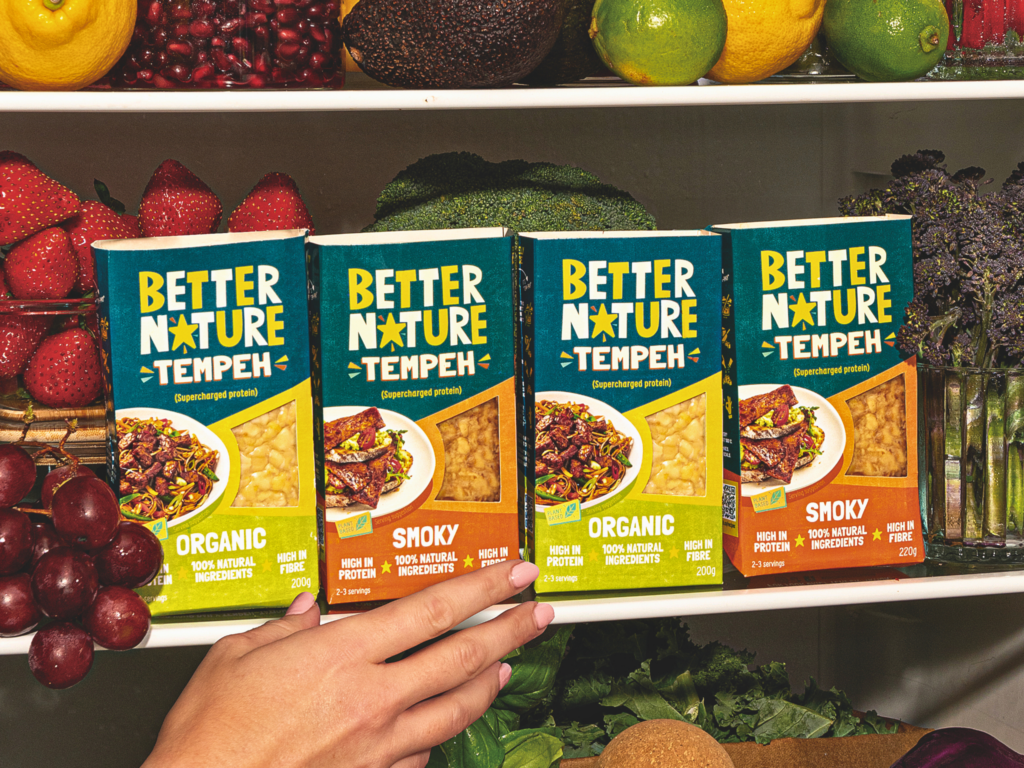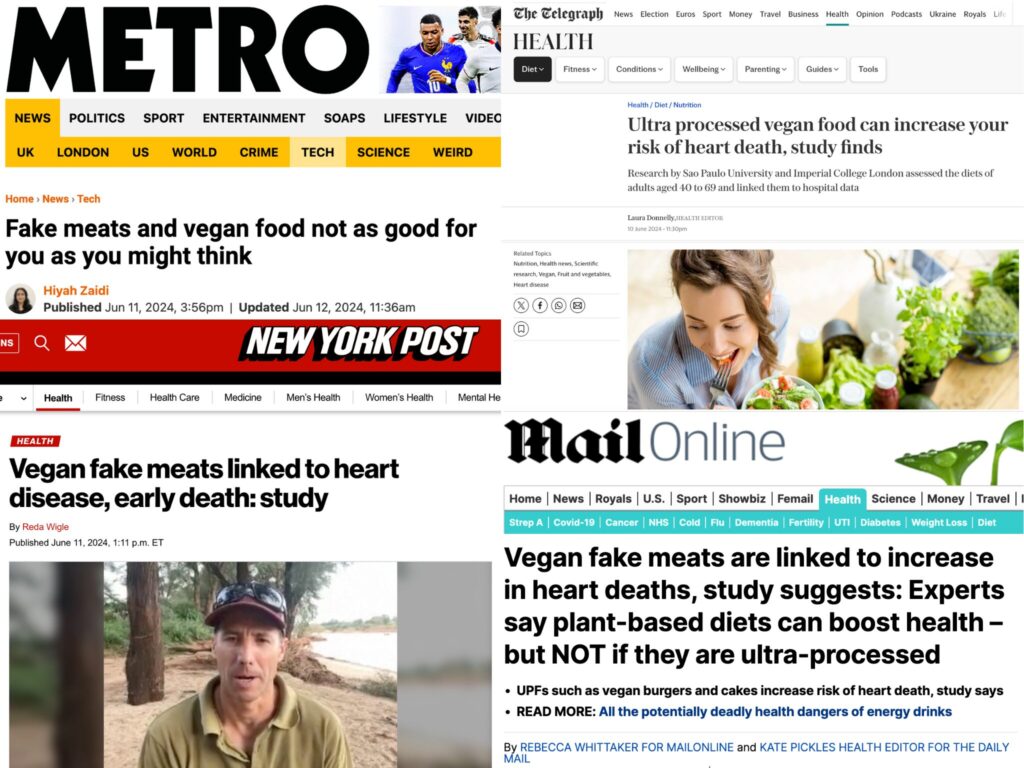Better Nature CEO: The UPF Debate Has Lifted the ‘Health Halo’ Around Vegan Food
7 Mins Read
Elin Roberts, co-founder and co-CEO of Better Nature Tempeh, believes the way people approach dietary change has shifted past vegan eating – and brands must too.
In 2023, Better Nature Tempeh introduced three marinated versions of its signature plant protein during Veganuary, positioning it as a fibre-packed food that can be counted as one of your five a day.
In 2024, it unveiled a smoky version of its tempeh to coincide with the campaign and cater to the demand for clean-label, unprocessed foods.
This year, though, the London-based brand is no longer talking about Veganuary, as co-founder and co-CEO Elin Roberts explained in an op-ed last week. But Better Nature is still pushing to reach Brits averse to ultra-processed foods (UPFs), a category most plant-based meat products fall into.
As a campaign, Veganuary has been instrumental in helping people steer their dietary decisions away from animal proteins. As Roberts pointed out, over three-quarters of UK consumers know about the month-long challenge, and 6% of the population have given it a go.

There’s no questioning the immense impact of Veganuary – you only need to look at the plethora of brands and restaurants (vegan and otherwise) coming up with offerings to support the campaign every year. When you look at it that way, Better Nature is an outlier.
“The Veganuary message of going fully vegan for the month isn’t resonating as widely as it used to,” Roberts tells Green Queen. “The conversation is changing. Rather than cutting out meat completely or switching to alternatives, many people simply want to add more plant-based foods to their diets.”
She reiterates her support for what Veganuary stands for, but doesn’t believe that talking about it is the right approach for her firm. “Instead, our focus is on health, positioning tempeh as a better-for-you protein,” she says. And while being plant-based is part of the appeal, it’s no longer a “defining feature”.
The UPF debate has changed the game for plant-based

The situation of plant-based meat in the UK is concerning. Government polling from 2024 shows that only 27% of Brits consume plant-based meat, and 44% never have. Here’s the kicker, though: 22% of respondents say they used to eat meat alternatives, but don’t anymore.
It’s a marker of the dissatisfaction around these products. A 2023 survey suggested that two in five Brits stop eating vegan meat products because of their taste, while another 20% do so for their price. At the same time, half of them were concerned that these foods are too processed. These apprehensions have translated into low sales, with volumes of meat-free products in the UK dropping by 9% in 2024.
UPFs make up 57% of an average person’s diet in the country, and up to 80% when it comes to children or people with lower incomes. And plant-based meat has suffered from a loss of confidence due to its classification as a UPF, driven by some very deceptive coverage by national media outlets.

“Whilst it’s simply misleading to tarnish an entire category with one brush (plant-based is hugely varied, with different brands serving different needs: some for convenience, some for indulgence, and others for health), the impact is hard to deny: vegan products have lost their health halo,” Roberts says on the impact of the UPF discourse.
“People are also confused. There’s so much misinformation out there now – people don’t know what to believe. Is vegan food good or bad? There are many articles arguing both sides.
“We, of course, advocate that it is good, if – like any diet – it’s managed properly, but we also appreciate that nutrition can be complex. That’s why messaging that is focused on eating more plant-based whole foods is resonating better – you can’t go too far wrong there.”
Even the UK’s largest retailer, Tesco, is banking on this – its Christmas range was dominated by vegetables over meat alternatives, after data showed that “veg-led meals” account for 40% of its plant-based sales.
Tempeh: a plant-based healthier chicken alternative
So where is the conversation headed now? “People are less focused on vegan food vs non-vegan food,” says Roberts. “Instead, they’re looking for food that’s good for them, the planet and animals vs food that’s not.”
Research has already shown that people are less influenced by terms like ‘vegan’ or ‘plant-based’ – words such as ‘healthy’ and ‘sustainable’ on product labels are more favourable. “We believe the biggest opportunity to influence dietary change is to tap into the growing number of people who want to add more healthy and sustainable plant-based foods to their diets,” notes Roberts.

“For a brand like ours, we want to reach as many people as possible – especially those eating meat. To do that, we’re positioning Better Nature as a healthier, ‘supercharged’ alternative to chicken. Not as the vegan alternative, though of course Better Nature being naturally plant-based is one of its credentials.”
If you follow the trends from the aforementioned 2023 poll, people want their meat replacement to taste like meat. How do you position tempeh in that landscape? “We don’t want to perfectly replicate chicken,” she says. “That would be impossible to do without the ingredients and processes that consumers are turning away from.
“However, we know two things. First, Chicken is the most widely eaten meat in the UK and second most widely eaten in the world. Second, tempeh – through its plain flavour, firm texture, absorption of flavours and high protein content – is an excellent swap for chicken in almost any dish, also offering consumers extra fibre, gut health benefits and plant points (as well as a shelf life that’s seven times longer). That’s why we call it supercharged protein, and chicken so-so protein.”

Aside from taste, Brits also want their food to be cheaper, especially plant proteins. Chicken, however, is highly subsidised, despite being produced in the most inexpensive ways possible, often making it the most affordable animal protein. “Currently, we can’t compete price-wise with the cheapest chicken products; however, we’re cheaper than any added-value chicken products such as free-range or grass-fed,” says Roberts.
“Tempeh, made simply of fermented soybeans and water, is a naturally inexpensive food. It’s much cheaper than chicken in Indonesia, where it’s from, for example. Therefore, we know that we can get it as affordable (if not more affordable) than chicken, it will just take us some time as we grow – especially as we never compromise on product quality and our ethical/sustainable credentials.”
Better Nature targets German expansion and new use cases
While we’re comparing chicken with tempeh, another product comes into mind. In 2023, Roberts’s fellow co-founder Christopher Kong teased a prototype of a whole-cut chicken breast made from tempeh mycelium. He called it Tempeh 2.0 “Tempeh has been around for hundreds of years, so we’re not reinventing the wheel. We’re just giving it a serious makeover,” he told Green Queen at the time.
Roberts confirms that this novel product is still under development. “The earliest it will be launched is in 2026 because we need to take it from pilot production to mass production,” she reveals. “That said, we hope to start sharing samples of our Tempeh 2.0 with select members of the public sooner than that.”

She’s speaking to Green Queen after a stellar year for the business, when sales grew by 457% as it became the second-fastest growing meatless brand in the UK. It also doubled its distribution, launched into Asda and Ocado, and secured a spot on Tesco’s new Accelerator Programme.
For 2025, Better Nature company has some new products in the pipeline to appeal to a wider audience and expand the use cases for tempeh.
“We’re planning more above-the-line advertising to drive up brand awareness, and we’ll be pushing for supermarkets to replace plant-based aisles with protein aisles, where meat-free and meat will sit side by side, making it easier for shoppers to choose Better Nature over chicken and other animal proteins,” says Roberts.
“Our goal is to see mainstream adoption of Better Nature as a protein staple on a global level, starting with further retail expansion in the UK and Germany this year, before looking further afield.”



